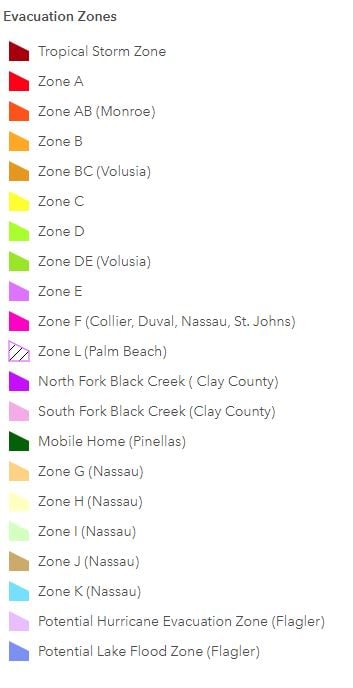Know Your Zone, Know Your Home
Every year it's important for residents to know if they live in an evacuation zone, a low-lying, flood prone area, a mobile home or an unsafe structure during hurricane season. These areas and buildings are most likely to be evacuated and knowing these zones helps Floridians prepare to evacuate and better understand orders from local officials.
This year, it is also very important for residents to know their home. If an evacuation order is not issued for your area and your house is not in an evacuation zone, you may consider sheltering in place. If you shelter in place, it’s important to know your home and its ability to withstand strong winds and heavy rain.
Instructions to Know Your Zone, Know Your Home
- Click Know Your Zone Map (Please note, the Division is continuously updating and making improvements to this website. If you are prompted to log in or are unable to access the map, please try again at a later time.)
- Type in your address
- Know Your Zone - Find if your address is in one of the colored evacuation zones (these are flood zones)
- If you are in an evacuation zone, listen to evacuation orders from local officials (Typically Zone A is the most vulnerable and the most likely to evacuate first. Zone E is most likely to evacuate last)
- If an evacuation order is not issued for your area, you may consider sheltering in place. Not all evacuations zones are always ordered.
- If you shelter in place, it’s important to Know Your Home and its ability to withstand strong winds and heavy rain
Take a look to see where your zone is at Know Your Zone Map.
Zone Designations

Frequently Asked Questions
The greatest threat to life from a hurricane is storm surge flooding. If you are in an ordered evacuation zone, low-lying flood area or in a mobile home, you should follow all evacuation orders. However, if you are not in an ordered evacuation zone, low-lying flood prone area, mobile home or unsafe structure, then it may be safer to stay in your home. Always heed the advice and orders of local officials during a storm.
If you are in an evacuation zone that is ordered to evacuate by local authorities or in a flood zone, you should evacuate no matter what. If you are not in any of these areas, then it may be safer for you to stay in your home. While it is the responsibility of the homeowner to know if their home is strong enough to withstand a hurricane, generally homes built after 2002 include features that make them more resilient to hurricanes. There are also improvements you can make to your home to strengthen it against future storms. Know your home and learn more by visiting https://floridadisaster.org/planprepare/secure-your-home/
The most important precaution you can take to reduce damage to your home and property is to protect the areas where wind can enter. According to recent wind technology research, it's important to strengthen the exterior of your house so wind and debris do not tear large openings in it. Learn more by visiting https://floridadisaster.org/planprepare/home.
Monitor local news and pay attention to alerts from authorities. Evacuation zones are designated from A to F. Generally, Zone A is most vulnerable and most likely to be evacuated first, and Zone F is most likely to be evacuated last. Take the time now to find out which zone you are in and remember to pay attention to local authorities during a storm to find out if an evacuation is ordered. Know your zone today by visiting https://floridadisaster.org/knowyourzone.
Check out this disaster supply checklist and use it to make sure you have what you need: Disaster Supply Checklist
If you need to evacuate, your safest and easiest option may be to stay with friends or family who live outside the evacuation zone or in a stronger house. Check with nearby friends and family now and have a plan in place for what to do if you are ordered to evacuate. Shelter information can be found at: https://www.floridadisaster.org/planprepare/shelters/.

